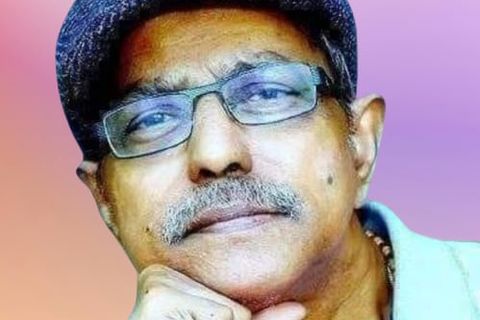RECKLESS REVELOUTION - STORY BY WILLIAMSJI MAVELI

THE RIVER OF MEMORY AND RESISTANCE
CHAPTER THREE
Opening her overslept eyes to the pre-dawn coolness, Ramya looked around. It was still dark, but the first whispers of light were painting the eastern sky. Dawn. The sun, she knew, would soon chase away the shadows, only to fade again hours later. The next room was empty. She got up hastily, a familiar hum of urgency already stirring within her, and walked to the kitchen.
Shyamala, her close friend and roommate, was already there, perched at the dining table, slowly sipping her coffee. Ramya sat next to her, reaching for her own mug. Just then, her mobile buzzed with a call from the Television Channel office.
"We've already snagged an exclusive interview for our new channel with the famous Viswanathan," Editor Chandran's voice crackled through the phone. "Will it be possible for you to be here at our office tomorrow early in the morning itself? I haven't slept since I started reporting on yesterday’s political murder – it’s been a non-stop run."
Ramya smiled. Chandran often joked that she was the one who woke him up before his alarm almost every day. It was no surprise then that she, the "boldest investigative journalist" he’d ever met, had secured the first interview with Viswanathan, the man who had kept the pulse of a revolution alive.
"The nightmare of 1975-77 is something India can never, ever forget," Ramya said, turning to Shyamala after hanging up. "Year after year since the Emergency was lifted, there's been a concerted effort to ensure that this brief moment in India's post-Independence history isn't erased from our collective memory. That itself would be a fearful thought."
"Yes, very true," Shyamala agreed, setting down her cup. "At the same time, for writers, there possibly cannot be a more detailed story to put into perspective. The cast of characters, the ingredients, the drama, the intrigue – there's so much in this story that every new recollection, each new perspective, is eagerly devoured."
Ramya's mind drifted back to the Emergency, to 1977, when she was a college student in the city. The burning of the college magazine, 'Prasakthi' (Significance), had kicked up a furious row. Scheduled for release in the 1976-77 academic year, it came out a year late, only to be met with the wrath of a student outfit. Alleging "anti-emergency slogans and remarks" and "normalization of crimes by terrorists," a group of regional political party activists had burnt copies of the magazine one Friday in June 1977. The act, ironically, had turned the magazine into a hit.
The delay in its release, staff editor Anil Varma admitted, was a fault, but he insisted its contents were an attempt to track the history of the suppressed lower caste. Student Editor George Stephan maintained they were trying to discuss the "politics of bad words" in society. But the opposition group, wanting to promote their ideologies, had incorporated recent Kashmir and related issues. Even accusations of placing "Hindu Gods in a bad light" and using "uncultured" words were hurled by politicians. Five students had even submitted a complaint to the city police commissioner.
This was the backdrop against which Ramya hurried to the channel office. Author Viswanathan was already waiting in the reception area, a quiet figure of immense gravitas. He was a notable writer who had found fame after the Emergency, having been unjustly jailed for simply writing against it. As a trainee journalist with one of India's most famous newspapers when the Emergency was declared, he had been imprisoned for about seven weeks. For a newsman, nothing was more annoying and frustrating than gathering national and local news that a true journalist knew could not be printed. This was a truth he, and many others, later depicted in books and movies about the Emergency's aftermath.
The interview discussion had already begun with Editor Chandran. Ramya apologized for her tardiness, but Viswanathan, without missing a beat, launched into his story, narrating everything as if he was compelled to lay bare the truth.
"There was this famous art movie," Viswanathan began, his voice taking on a narrative cadence, "with a beautiful title, named after a river: 'Kabani'. It spoke of both revolution and romance. Its central character was a young man with an extreme leftist philosophy. The choice of such a theme, at a time when the whole country was stirred by political commotion, was reason enough for the authorities to brand it as a movie propagating revolutionary thoughts within Kerala."
He paused, a flicker of memory in his eyes. "The locations chosen were in Karnataka, in and around the Kabani river. One reason was that Karnataka at the time provided subsidies for films made there, unlike Kerala. Though the film had nothing to do with the Emergency, the police and intelligence agencies kept the shoot under their radar. Their presence on the sets frightened people, who refused to give permission to the producer and director to shoot on their premises. In fact, a major chunk of the unit also decided to keep away."
He leaned forward, his voice gaining intensity. "Thirty years back, this river Kabani would flow spontaneously for at least eight months a year. Even when it dried up, there was enough water for cattle and daily needs. Farmers near the river would build small check-dams to irrigate their winter crops. The turmeric crop, for which this region was known, was made possible by the river."
Viswanathan’s gaze seemed to pierce through the studio walls, seeing not just the past, but the profound shifts in the present. "Today, the flow does not last for even the four monsoon months. The self-sufficient turmeric cultivation is gone, and now farmers have to either invest in wells and bore wells for irrigation, or try to earn enough political clout to get dam water. But more than that, somewhere, the connection between the river and people has been lost. There is no desire left to connect with the river, to at least protect what is left, to once again build up at least a bit of the great relationship that is lost."
He continued, "The implication of the river is not only metaphorical or symbolic; it is inherently linked to our physical daily flow in life. One day, all our proceeds, treasures, and belongings come together into one, and a river may run through the obstacles of hard rocks, wet soil, barren land, or dense woods. The blue river was cut into two by the world's great flood and runs over rocks from the basement of Mother Earth over ages and years. Some of the rocks are enduring either dewdrops or sprinkles of rain showers. Under the rocks and between the drizzles of life are alphabets, words, sentences, and phrases. Some of the words are from the bounty of the blue rivers, and we are all obsessed by misty dewdrops, drizzling rain showers. The storm of our own minds still continues. Another blue river of life overflows much violently, later so silently. What a splendor of nature for nature's loneliness. When a new shoreline on the sides of a life journey, the morning and evening were not enough through the loneliness of nature; however, the extensive pouring of the earliest, broadest sky is infinitely flowing above. Uncounted sounds of birds full of spirits."
"As news of police brutalities from across the country filtered in," Viswanathan resumed, pulling back to the movie's narrative, "the producer and his team made changes in the movie script. Each day offered new challenges, which they managed to surmount with great difficulty. The shoot went on. That was when one of their friends, a leading author and publisher of a Leftist magazine inspiring revolution, came to the location. The producer and director offered him a role, which he accepted with reluctance. The shoot continued with the police keeping a close tab on the crew. They would arrive occasionally, call up members of the cast and crew at random, and question them."
"Finally, the producers managed to complete the shoot and can the film. They now faced another obstacle – editing. The producer, along with the director, went to Madras, now Chennai. Here too, the long arms of Emergency caught up with them. They were arrested, questioned, and released after a few days, on condition that they report to the police station whenever summoned. This harassment did not end. They were arrested when they reached the Kerala border. They were imprisoned, and their long hair was cropped. No case was registered against them."
"The Film Censor Board in the state also viewed this film with preconceived notions. This affected how the film was censored. The reason they gave was 'revolutionary and related thoughts.' The woes continued even after the movie, which was shot entirely in black and white with a beautiful title, 'Kabani Nadi Chuvannappol' (When Kabani River Turned Red), was released. When it was being screened in Thiruvananthapuram, the police stormed the theatre. The reason given was 'complaints against the film.' They found a group dance sequence in the film where the dancers wore masks 'highly objectionable' and demanded its removal."
"The movie team lost confidence and decided not to send the film to theatres. The movie was confined to film society screenings. Yet, this film, created amidst all these setbacks, went on to win the Kerala State Award for Second Best Film, and the director won the Best Director award."
Viswanathan's voice lowered, a somber note entering it. "But the real story, the deeper river of pain, was about something else. The engineering student's body was never found. But his father’s spirit was so unrelenting in the pursuit of truth that, although the police denied all through having taken the youth into custody, he never gave up. 'Why are you making my innocent child drown in the Kabani river even after his death?' the movie ends with this question mark."
He looked directly at Ramya and Chandran. "'Let at least my invisible son know that his father never shut the door,' the victim's beloved father, a retired Hindi professor, wrote in his autobiographical book, describing why he could not give up his struggle until the police admitted they had killed his son."
"Revolutions have occurred throughout human history," Viswanathan continued, now speaking with the authority of someone who had lived through one, "and vary widely in terms of methods, duration, and motivating ideology. Their results include major changes in culture, economy, and socio-political institutions, usually in response to perceived overwhelming autocracy or dictatorship."
"I was among the detainees at the Kakkayam torture camp with that missing engineering student," he revealed, his words hanging heavy in the air. "Apparently, the victim did not survive the torture. His father, in his book, says his son was with a youth festival team from the college the night the Naxalites attacked a rural police station at Kayanna, in Kozhikode district, taking away a rifle and causing some vandalism. This fact was easily verifiable from the other students in the team. It was on suspicion of his involvement in this attack during the year 1976 that he was taken into custody by the police. The arrest occurred in the front yard of the Regional Engineering College, now a National Institute of Technology at Chathamangalam, in Kozhikode. He was stepping out of the college bus bringing back students who had participated in an inter-collegiate youth festival when they took him into custody. They just took him, tortured him, and killed him. That was all that happened. Somebody gave the police a list, and they picked up people from that list, his own aged father mentioned in his autobiographical book."
"According to another former Naxalite leader and poet," Viswanathan concluded, his gaze hardened, "hardly anything about the excesses that were going on in the State in the name of Emergency reached the general public because of a total censorship of the media, to which the media succumbed without much resistance." He then narrated a chilling story about how, while hiding from the police, he had gone to the printing press of his most loved newspaper, only to find it silenced.
"The main target of the crackdown against anti-Emergency forces was the Naxalites, because they were into direct action like attacks on police stations. A large number of activists and most of the leftist leaders in the State too were put in jail, but spared violent handling by the police."
Viswanathan described what had subsequently received much notoriety as the "uruttal" method of interrogation. "It involved the use of a long wooden rod, called 'olakka' in Malayalam, which is a traditional implement for pounding paddy rice or any other seeds to make eatable. The interrogators would place it across the thighs of the interrogated after forcing him to lie on a bench. Two heavily built policemen would use their weight from either side of the 'olakka' and roll it slowly up and down, up and down, till he fainted."
He paused, letting the silence of the studio absorb his words. "There would be no visible injury. But the entire length of his thigh muscles would be crushed into a jelly. The next day, they would not have to beat you. Just a gentle tap with a stick on the thigh would make you shriek out in pain."
Chandran and Ramya sat in stunned silence, the weight of the past filling the room. The river of memory, long suppressed, had finally overflowed.
WILLIAMSJI MAVELI
STORY WILL BE CONTINUED......
Like 0 Pin it 0



